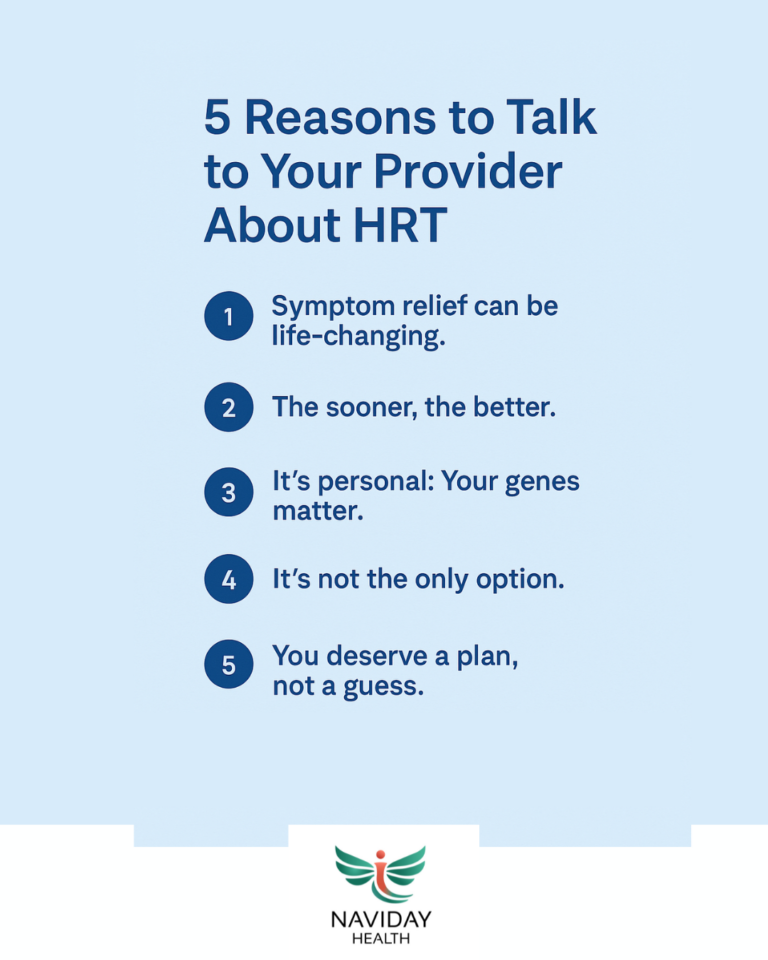
Hormone Replacement Therapy (HRT) isn’t new—but today, it’s being reevaluated with modern science, personalized care, and better understanding of who it works for and why.
For women navigating perimenopause, menopause, or post-menopause, HRT can be a powerful tool for managing life-disrupting symptoms like brain fog, mood swings, hot flashes, and sleep disruption. Yet despite its proven effectiveness, HRT remains underused and often misunderstood.
This article outlines what HRT is, when it’s recommended, why genetics matter, and how to make an informed decision—whether you choose HRT or explore alternatives.
What Is Hormone Replacement Therapy?
HRT involves supplementing the body with hormones—typically estrogen and sometimes progesterone—to relieve symptoms caused by hormonal decline during midlife transitions.
Common options include:
Estrogen-only therapy (oral, patch, gel, or vaginal)
Combined estrogen and progesterone therapy
Bioidentical hormones, custom-compounded to match individual hormone levels
When Is HRT Recommended?
HRT is most often considered for:
Perimenopausal women with severe hormone fluctuation symptoms
Menopausal and postmenopausal women experiencing vasomotor symptoms, vaginal dryness, or bone loss
Women under age 60 or within 10 years of entering menopause, which is considered the safest window for initiation
📌 Source: North American Menopause Society (2022) Position Statement
Symptoms That May Indicate HRT Could Help
If you are experiencing any of the following, a conversation about HRT may be worth initiating with your provider:
Hot flashes and night sweats
Memory and concentration issues (brain fog)
Vaginal dryness or painful intercourse
Anxiety, mood swings, or irritability
Insomnia or chronic fatigue
Signs of bone thinning or osteopenia
Why Genetic Testing Matters
HRT is not a universal solution. Genetics play a critical role in determining:
How your body metabolizes estrogen or progesterone
Your risk for hormone-related conditions like breast cancer or blood clots
The type and dose of therapy that may work best for you
Genetic and pharmacogenomic testing can guide safer, more personalized treatment decisions.
📌 Source: NIH / PharmGKB – Hormone Replacement Therapy Overview
What the Research Says
Modern studies have reframed the risk-benefit conversation around HRT:
HRT reduces hot flashes and night sweats by up to 90%
Many women report improved cognitive clarity, mood, and sleep quality
When initiated before age 60 or within 10 years of menopause, HRT often carries a more favorable safety profile
📌 Source: JAMA – Menopausal Hormone Therapy and Long-term All-Cause and Cause-Specific Mortality
A Real-Life Example
A woman in her early 50s struggled with mood swings, restless nights, and memory lapses that disrupted both work and family life. After reviewing her symptoms and lab results with a provider, she began low-dose HRT paired with lifestyle changes. The results were dramatic—within weeks, her sleep improved, her clarity returned, and her emotional stability felt restored.
This isn’t just about hormones—it’s about giving people the ability to feel present and capable in their own lives again.
Alternatives to HRT
Not everyone is a candidate for HRT, and some may prefer non-hormonal strategies. These alternatives can offer meaningful relief and long-term support:
Lion’s Mane mushroom – A nootropic known for potential cognitive benefits
📌 BioMed Research International (2020)Mindfulness and breathwork – Effective for reducing hot flash severity and emotional stress
📌 Mayo Clinic Proceedings (2011)Acupuncture and herbal therapies – Used in integrative approaches for symptom management
Weight-bearing exercise and nutrition – Vital for maintaining bone health, reducing inflammation, and supporting mood
Final Thoughts
HRT is a tool, not a mandate. The most important step isn’t the prescription, it’s the conversation.
If you’re experiencing symptoms that disrupt your quality of life, speak with a licensed provider or a functional medicine practitioner. Ask questions. Explore options. Use your data and your voice to decide what’s right for you.
The future of care isn’t about guessing. It’s about listening, testing, and tailoring support that meets you where you are.


